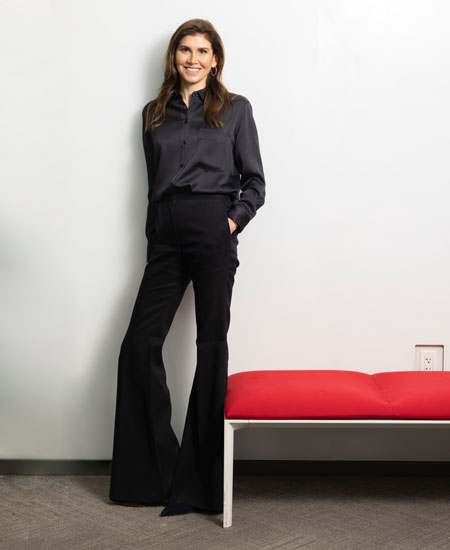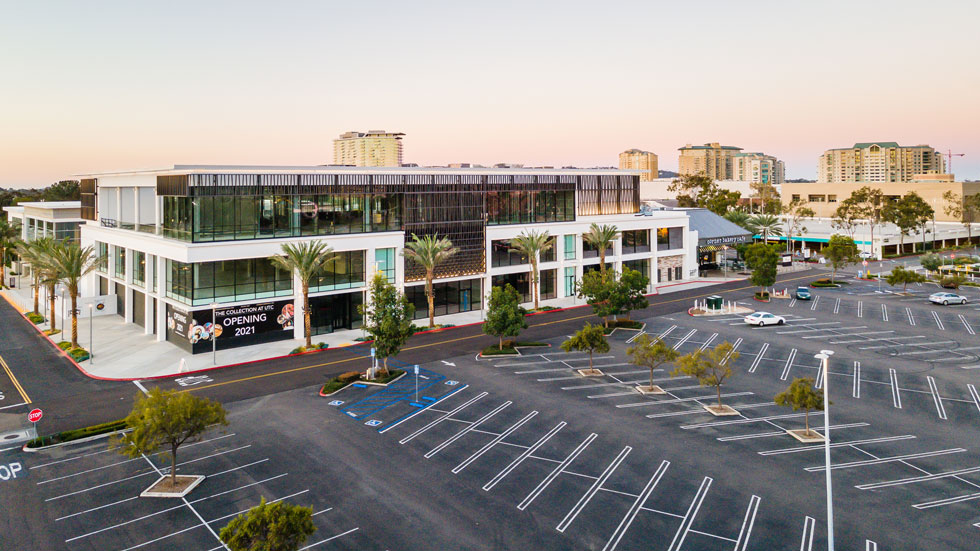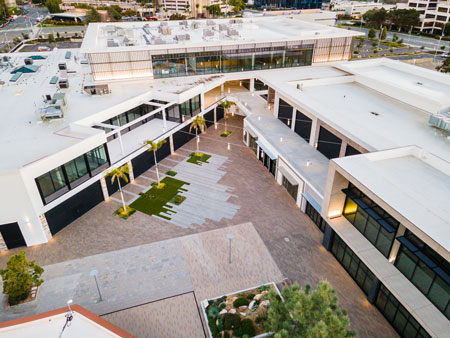Andrea Olshan left the family business to join Seritage Growth Properties as CEO—and is now repositioning again as the company drops its REIT status.
After more than 16 years at Olshan Properties, her family’s business, Andrea Olshan traded CEO titles in March 2021 to join Seritage Growth Properties (NYSEMKT: SRG). Seritage owns a portfolio of former Sears and Kmart parcels with the broad mission to maximize the value of these former retail assets. (In fact, this is where the company’s name comes from: Sears, plus the word “heritage”; when pronounced correctly, Seritage rhymes with heritage.)
Olshan says that since she joined the company, Seritage has conducted a comprehensive review of its portfolio, property by property, to determine the best strategy for each asset, which sometimes means selling assets to recycle capital into higher yielding opportunities. In March 2022, Seritage announced the termination of its REIT status, retroactively effective to January 1, to provide the company maximum flexibility to pursue accretive transactions.
“There’s a tremendous disconnect between the stock price and the value that we’ve created and continue to build,” she says. “We’re committed to exploring a broad range of alternatives to pull forward this value while continuing to execute on our business plan.”
Olshan, an avid baseball fan (“The Yankees. All day long.”), was raised in New York City, attended Columbia Business School, and still lives and works in Manhattan. She grew up in business at Olshan Properties, formerly known as MPI or Mall Properties, Inc., which is a privately owned real estate firm that develops, leases, and manages commercial real estate in the retail, hotel, office, and residential sectors across 11 states.
“Coming from a family business background, you really are a terrific partner because you are so invested and have such a high level of accountability to your family, that your sense of responsibility for every decision and every dollar is so great,” Olshan says. “You really look at everything as your own.”
Olshan recently spoke with REIT magazine about Seritage’s decision to terminate its REIT status, her fondness for her father, who founded Olshan Properties, and why it’s important for women in business to help each other unlock doors.
What factors went into your decision to convert to a C-Corp?
We’re always looking for opportunities to maximize shareholder value. As part of this, we look at ways to pull value forward in order to take advantage of strong current demand for well-located assets like ours that are well-leased with solid cash flow or have the potential to be redeveloped into multifamily, tech office, and life sciences campuses. As a C-Corp, we don’t have restrictions on selling assets, allowing us greater flexibility to time sales to markets and pay off debt sooner, lowering our cost of capital.
When considering the change in tax structure to allow us to maximize flexibility in our strategic process, we modeled potential tax efficiency extensively to properly weigh the costs and benefits, factoring in our valuable net operating losses that we can continue to utilize as a C-Corp. In consultation with our auditors, legal advisors, the Special Committee, and our financial advisors, we determined that converting to a C-Corp was the right next step to give our board the greatest flexibility in exploring strategic alternatives to maximize value for our shareholders.
What makes now the right time for this pivot?
We really refined the business significantly in the last year, focusing our teams on executing our value creation strategies for all properties, and we’ve made meaningful progress across our portfolio of multifamily, retail, office, life sciences, and mixed-use sites.
Two great examples of how these plans are being realized are our University Town Center (UTC) property in La Jolla, California, and our Esplanade at Aventura property in Florida. We opened our site at UTC almost fully leased to best-in-class retail and restaurant tenants on the ground level and an Amazon headquarters for 700 employees on the upper levels. Our retail/office/restaurant/entertainment development in Aventura is also significantly leased, and we’ll open that premier property by year-end.
We’ve made tremendous leasing progress more broadly across the multi-tenant retail portfolio, which is composed of nearly fully stabilized, cash-flowing properties ripe with many additional outparcel opportunities.
Are there specific benefits you expect Seritage to gain from the conversion?
Speed and flexibility to execute on a variety of value-maximizing strategies—that’s what this conversion is about. We have a diverse portfolio, so maintaining flexibility as to how best to achieve maximum value for each asset and for the portfolio as a whole is critical to the success of our strategic review process.
How will this decision impact shareholders?
This decision will allow us to pull value forward quickly and creatively. It will give us more flexibility as to both the types of transactions available for us to pursue and the timing of those transactions, allowing us to better maximize total shareholder return.
Turning to your career path, what made you decide to leave your family-owned company, Olshan Properties, to run Seritage?
The talent at Olshan is incredibly strong, so I felt 100% comfortable turning over the day-to-day management of the company to Zach (Bornstein, president) and the seasoned executive team, and this provided a great opportunity for them to build on our success and take the company to new heights. At Seritage, I saw an opportunity to work on one of the most incredible real estate portfolios in the country. Being able to run a public company and reimagine and redevelop almost 200 high-quality sites [as of my arrival], naturally, was too exciting to pass up. It was really just a perfect combination of being great for me and great for Olshan.
How does Seritage’s day-to-day business run?
At a high level, Seritage is a platform for creative value maximization. Our mandate is to reimagine the use case for each property within our portfolio of former Sears and Kmart parcels, and then execute on their redevelopment into multifamily, office, life sciences, retail—or whatever mix of uses creates the most value for our shareholders.
I refer to the parcels, not just the built stores, because the opportunity is as much in the land. Our land parcels average close to 14 acres per site and are extremely well-located with great visibility, access, and parking, which gives us a tremendous opportunity to create value. It’s incredibly exciting to allow these properties to find their future uses, which have a much greater value to both our investors and to the communities that they’re in.
What mentors have had the greatest impact on your career?
The most obvious mentor in my life, personally and professionally, is my father (Morton Olshan). He has always challenged and pushed me, and I’m very lucky that I have someone who has taught me so much but has also been so supportive. Even though he is in his mid-90s now, he is still so interested in everything that I’m doing professionally. He has joined me in visiting Seritage sites, always sharing his thoughts and observations, and I’m just very fortunate to have him in my corner continuing to mentor me.
While my father has been an incredible mentor, when I came to Olshan there were very few women in leadership positions. As such, I had to go outside of the organization to seek mentorship from other women in real estate. Wendy Silverstein was one of these women who not only has been a mentor to me, but also has taught me, through her example, to be a mentor to other women in the industry.
When I joined Seritage as a new public company CEO, I was fortunate to be able to call upon Wendy and bring her and her team in to work with us. Having a network of smart, capable women across the industry has proven invaluable, and I try to pay this forward every day. Wendy is a champion of women in real estate, and mentors and supports many women through the industry and across generations. She has brought me and many of my peers into the most incredible community of brilliant women who I am continuously in awe of and humbled by. It is our responsibility to take up this charge, support our female peers and mentor the women who are coming up in the business now.
What is it about this network of women that has meant so much to you?
What has been so incredibly valuable to me is that I’ve been able to access women who I ordinarily would not have gotten to know based on my day-to-day business interactions. Even still, these super successful—and super busy—women have gone out of their way to be generous with their time and relationships. They have opened doors for me that have had direct benefit to my work and given me access to resources that other advisors were not able to provide.
What’s the best career advice you’ve ever received?
The best career advice was from my father, who always taught me to be overly prepared for every meeting that you go into. Study the deals, even if you’re going to a friendly lunch with a partner—review the financial statements of all the deals that you have together. Know all the issues, know about any capital needs that are coming, or any strategy that you want to discuss, and walk into everything as knowledgeable as possible.
From Olshan more generally, I learned to always think like an owner and look at every dollar as your own and every decision with a lens to how it reflects on the morals and values of your entire family and your good name. I believe bringing this sense of ownership to my leadership sets me apart and gives me a sense of purpose and determination that I have found vital and hope to instill in all those I work with.
What personal activities help keep you grounded in your career?
My number one non-work activity is time with family. Even though I work a lot, I spend very focused quality time with my family on the weekends. It’s something that’s sacred for us. We do simple things together like hiking, cooking, and solving jigsaw puzzles; things that allow us to talk and connect.
In general, I have always loved solving riddles and untying knots—my happy place is making order from chaos. There are times when I’ll be sorting bins of Legos with a smile on my face. In my day job, things are very complicated and nuanced, and you can only control a small portion of what goes on. That level of complication at Seritage is so interesting, but there’s also something so satisfying about putting a piece into its place. I think my calm and measured approach to complication and doggedness in working toward a solution has been critical to my approach to both the company and the portfolio and is essential to my leadership success.
Where do you see yourself professionally in five years?
At Seritage, I’m continuously growing and learning. In general, I feel more alive when I’m challenged. As such, no matter what I do going forward, I would only look for opportunities where I could grow while being challenged and learning.
While my experience was exceptional, I’ve always been very clear that I have no intention of returning to Olshan. I’m always going to be connected to the company and the portfolio, but the team is doing a terrific job and they don’t need me. Having the best of both worlds and pursuing interests outside of Olshan—while relying on the backbone of what I learned there and always having the connection as an owner of the business—is really the perfect combination.



